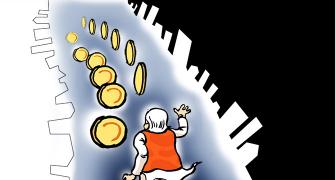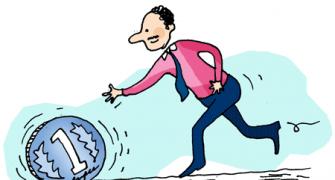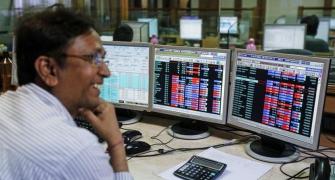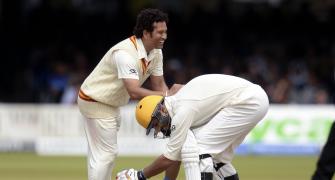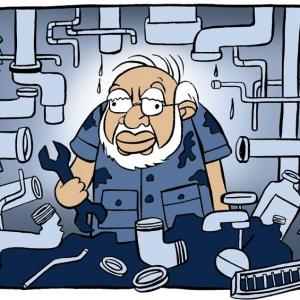'The government's principal aim should be to reduce the volume of cash transactions.'
'That would bring more of the Indian economy within the purview of taxation.'
'The current downturn in economic activity due to a lack of adequate cash is likely to be limited to a year,' says Jaimini Bhagwati.

In Homer's Odyssey, the principal protagonist Odysseus had to navigate between a six-headed man-eating cliff-dwelling monster Scylla and a dangerous whirlpool Charybdis.
According to the legend, Odysseus kept away from Charybdis since straying close to a whirlpool could mean losing his ship and preferred to slip by closer to Scylla and lose a few men.
Post demonetisation, the central government must feel like Odysseus, wondering how best to ensure lasting benefits and keep its political losses to a minimum.
Many employed in the informal sector are hurting badly because of the cash crunch.
And, for the next two quarters, employment opportunities for daily cash wage workers may continue to shrink.
Given the consequent possibility of widespread public disaffection, the government is riding the demonetisation tiger akin to the lady in the limerick: There was a young lady of Niger,
who smiled as she rode on a tiger,
they returned from the ride,
with the lady inside and the smile on the face of the tiger.
Are the palpable dislocations and reduction in employment/growth caused by demonetisation justified if the principal objective was to nudge the economy towards a higher proportion of cash-free transactions?
If all Rs 500 and Rs 1,000 notes are deposited in banks by December 30, would no progress have been made in reducing 'black' money?
Demonetisation alone cannot prevent tax evasion, printing of counterfeit rupees or funding of terrorism.
However, this abrupt move has unnerved those who accumulate ill-gotten wealth.
If there is systematic and diligent follow-up, the costs of evading taxes could become higher and benefits of clandestine investments in real estate/precious metals/accounts abroad somewhat more difficult to enjoy.
Specifically, demonetisation would inhibit future financial wrongdoing if the tax returns of all those who make large deposits compared to their declared income are checked meticulously.
Concurrently, the tax, police, administrative and bank personnel have to be warned starkly against using information about disproportionately large deposits to extract rents.
On balance, given the collateral damage inflicted by demonetisation, the government's feet need to be held to the fire and its sincerity in addressing tax evasion could be judged by whether it is prepared to take the following steps sequentially.
First, the government should announce phasing out of all high denomination notes above Rs 100 over the next five years.
This would give time to print more Rs 100 notes, improve Internet connectivity around the country, provide point-of-sales (PoS) machines and increase financial numeracy to effect cash-free transactions using low-cost android phones.
It should be mandatory, after a grace period of say two years that single transactions above Rs 25,000 have to be settled by means other than cash.
For all purchases above Rs 50,000, the buyer's PAN should be recorded.
If there are multiple transactions between the same vendor and purchaser and the total goes beyond Rs 25,000 or Rs 50,000, electronic payment and recording of PAN number should be compulsory.
Charity should begin at home for the ruling party and legislation should be passed for donations to political parties to be deposited in bank accounts, which would be independently audited.
Plus, the Bharatiya Janata Party should take the lead in accepting that it falls within the purview of the Right to Information Act and propose taxes on high agricultural income.
The ministry of corporate affairs, scheduled commercial banks and particularly non-bank finance companies need to work with the Reserve Bank of India to identify shell company accounts through which unaccounted funds are laundered.
India is unique that even mainstream Nifty companies set up NBFCs ostensibly for tax avoidance purposes.
It is a well-known secret that the complicated ownership structures of many NBFCs are designed to evade taxes.
The RBI probably feels that it, too, is between a rock and a hard place due to the imponderables unleashed by demonetisation.
As of now, it appears that the deflationary impact due to the paucity of cash could persist through the calendar year 2017.
Private analysts have suggested a drop in inflation and reduction of 2% or more in economic growth over the next one year due to demonetisation. Accordingly, banking circles felt that the RBI would reduce its benchmark repo rate.
However, the spread between Indian rupee interest rates and returns on corresponding maturity of US dollar fixed income securities is likely to decrease as the US Federal Reserve raised its benchmark interest rate by 25 basis points on December 14.
Net capital outflows could rise sharply if the returns on Indian assets are judged to be inadequate by foreign investors after adjusting for the credit and exchange rate risks involved.
Analysts who were predicting at least a 25 basis points cut in the rupee repo rate need to recalibrate their thinking. They appear to have focussed only on inflation.
Although the rupee is currently at least about 10% overvalued against the US dollar, it should be allowed to depreciate gradually.
A sharp downward spiral of the rupee exchange rate would be counterproductive.
On balance, the RBI's recent decision to leave its benchmark repo rate unchanged at 6.25% was prudent.
The government's principal aim should be to reduce the volume of cash transactions.
That would bring more of the Indian economy within the purview of taxation.
The current downturn in economic activity due to a lack of adequate cash is likely to be limited to a year till cash levels in the economy gradually return to pre-November 8 levels.
By contrast, the higher taxes collected and the benefits of greater probity in public and private life could be sustainable.
That is, as more of the underground economy is accounted for, larger numbers of Indian citizens could be induced to conclude that the benefits outweigh the costs in favour of declaring full income and paying the corresponding higher amounts of taxes.
Jaimini Bhagwati is the RBI Chair Professor at the Indian Council for Research on International Economic Relations.
Photograph: Prime Minister Narendra Modi in Varanasi, his Lok Sabha constituency, December 22, 2016.


